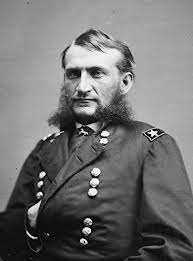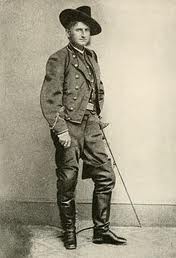 General “Kill Cavalry” Kilpatrick was either a brilliant and courageous tactician or just a rash, self-centered bully or basically Sherman’s Damned Fool. Kilpatrick was a product of the military mindset of the day. A brilliant, aggressive, shrewd, officer could dictate a successful public or political future. “Kill Cavalry” had all the personal traits to accomplish these goals and early in his career, Kilpatrick predicted he was destined to become an Army General, Governor of New Jersey and finally President of the United States. As a military leader, Kilpatrick, would become infamous for his total disregard of human life and would sacrifice his command’s forces on a whim, rather than sound strategic judgement.
General “Kill Cavalry” Kilpatrick was either a brilliant and courageous tactician or just a rash, self-centered bully or basically Sherman’s Damned Fool. Kilpatrick was a product of the military mindset of the day. A brilliant, aggressive, shrewd, officer could dictate a successful public or political future. “Kill Cavalry” had all the personal traits to accomplish these goals and early in his career, Kilpatrick predicted he was destined to become an Army General, Governor of New Jersey and finally President of the United States. As a military leader, Kilpatrick, would become infamous for his total disregard of human life and would sacrifice his command’s forces on a whim, rather than sound strategic judgement.
Hugh Judson Kilpatrick, born in 1836, in New Jersey, with hardly any formal education, he finally gained admittance to the United States Military Academy and graduated in 1861. His history of Academy life is marred by a series of brawls with Southern cadets and Kilpatrick’s pro-Union and anti-slavery proclivities led to his immediate enlistment after graduation. Instead of his posting as an Artillery Officer, Kilpatrick volunteered as an officer with the 5th New York Infantry and was soon promoted to Captain.
 At the Battle of Big Bethel, Kilpatrick was wounded in the rear-end by a shell fragment and the Eastern press seized upon this minor event and proclaimed Kilpatrick a hero, being the first Officer wounded in the Civil War. An embellished tale or fodder for a hungry press, “Kill Cavalry” milked this notoriety for all it was worth and parlayed the wounding into a promotion to a Lieutenant Colonel in the 2nd New York Cavalry. At this juncture a contemporary noted that Kilpatrick was a wiry, little fellow, with bandy legs, stringy hair and sideburns, fiery and combative by nature. While the diminutive colonel was leading daring raids, destroying railroads, bridges, farms and barns, behind enemy lines, fearlessly charging enemy encampments and supply trains, his reputation with his troops was suffering. Kilpatrick’s rank and file had little or no respect for their self-centered leader. His ambition was more important, than their safety and his ambivalence towards the welfare of his command was beyond evident. During these early Civil War actions, Kilpatrick’s lack of well planned manuever and strategy led to horrendous deaths and casualties among his troopers and after Gettysburg he earned his nom de guerre, “Kill Cavalry.” One officer remarked disgustedly that Kilpatrick’s campaign reports were “great
At the Battle of Big Bethel, Kilpatrick was wounded in the rear-end by a shell fragment and the Eastern press seized upon this minor event and proclaimed Kilpatrick a hero, being the first Officer wounded in the Civil War. An embellished tale or fodder for a hungry press, “Kill Cavalry” milked this notoriety for all it was worth and parlayed the wounding into a promotion to a Lieutenant Colonel in the 2nd New York Cavalry. At this juncture a contemporary noted that Kilpatrick was a wiry, little fellow, with bandy legs, stringy hair and sideburns, fiery and combative by nature. While the diminutive colonel was leading daring raids, destroying railroads, bridges, farms and barns, behind enemy lines, fearlessly charging enemy encampments and supply trains, his reputation with his troops was suffering. Kilpatrick’s rank and file had little or no respect for their self-centered leader. His ambition was more important, than their safety and his ambivalence towards the welfare of his command was beyond evident. During these early Civil War actions, Kilpatrick’s lack of well planned manuever and strategy led to horrendous deaths and casualties among his troopers and after Gettysburg he earned his nom de guerre, “Kill Cavalry.” One officer remarked disgustedly that Kilpatrick’s campaign reports were “great
in ‘the most glorious charges ever made,’ ‘sabering right and left,’ and such
stuff.” Another observer called him a “frothy braggart, without brains,” while a
third saw him as an “injudicious boy, much given to blowing and who will surely
come to grief.”
Before the Battle Gettysburg and his promotion to Brigadier General, Kilpatrick was embroiled in several career damaging events that impaired his reputation and future. Kilpatrick’s encampment was notorious for lack of discipline, the troopers often drunk and prostitutes frequented not only the enlisted, but also Kilpatrick’s Headquarters. If visiting officers were seeking a lively time, they could always expect an entertaining adventure at “Kill Cavalry’s” HQ. In addition, Kilpatrick spent several weeks in jail on allegations of taking bribes from horse traders dealing with his command, was also incarcerated for selling confiscated grain and supplies to black market profiteers, and was again held on charges, that while on a drunken spree in Washington, he had defamed prominent politicians and military officers. In spite of all the home front infamy, Kilpatrick was promoted to Brigadier General and performed a stellar role at Brandy Station and Gettysburg. However, there was one problem with a subordinate in his command and that burr, was the rising star and fame of General George Armstrong Custer, a favorite and golden boy of General Meade.
General “Kill Cavalry” Kilpatrick needed a daring escapade, that would that would dispel the negative public sentiment and maintain his self-image as the premier Union Cavalry Hero, squelching the acclaim of the upstart Custer. Kilpatrick petitioned President Lincoln directly, on a plan to raid Richmond and rescue the Union Prisoners held in the camps surrounding the Confederate Capitol. This manuever, like many of Kilpatrick’s ill planned and conceived strategies was an utter failure, resulting in the loss of hundreds of troopers, killed, wounded and taken prisoner, damaging public and political sentiment and was “Kill Cavalry’s” fall from grace, in the ranks of the Eastern Theater during the Civil War.
Most commanding Generals during the Civil War recruited staff officers that complimented their political and military incentives. However, General William T. Sherman, commanding the Western Theater, appeared to end up with more than his share of the dregs, misfits, rejects and Lincoln’s and Grant’s disappointments. Sherman accepting the transfer of Kilpatrick stated,
“I know that Kilpatrick is a hell of a damned fool, but I want just that sort of man to command my cavalry on this expedition.”
General Hugh Judson Kilpatrick served Sherman valiantly in his Georgia and Carolina Campaigns, wounded at Resaca, recovering in time to finish “The March to the Sea” and accompanied General Sherman to the surrender near Durham, North Carolina, in April of 1865. Kilpatrick did become a general officer, never a Governor of New Jersey, and certainly not President of the United States. General “Kill Cavalry” Kilpatrick would have to be satisfied remaining, Sherman’s Damned Fool.
Bummer


In Vietnam “Kill Cavalry” would have been a strong candidate to get fragged by his own men. Since I’m not familiar with his post-Civil War career, I picture him becoming one of those incompetent officers shipped west for the Indian Wars as depicted in movies like “Dances With Wolves.”
Louis,
Northern Plains Blizzard playing havoc with Bummer’s internet. General Kilpatrick would never have come home from Nam or possibly lived and would have been to afraid to return to “the world.” Actually he was posted as a American Minister to Chile. Some sort of political pay off, called back to the States after another fiasco, posted again to Chile and died. Sherman’s will, character and no-nonsense persona must have been the secret to his success and brother John, it sure wasn’t the depth of his staff.
Bummer